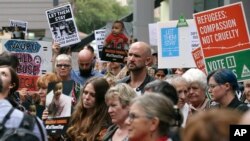Australia plans to build another detention center for failed asylum seekers in Papua New Guinea (PNG). An existing facility on Manus Island in PNG is due to close within weeks and was found to be unconstitutional by a court last year. The decision has left many detainees in limbo.
Australia has detained asylum seekers who try to reach its shores by boat on camps in the South Pacific. About 800 men have been held at a migrant processing facility at Manus Island in Papua New Guinea. Around 600 detainees have had their refugee claims approved, and could be resettled in the United States under a deal struck between Canberra and Washington last year.
The fate, however, of 200 men at the so-called Regional Processing Center on Manus Island who have had their asylum applications rejected is unclear. About half of this group is expected to be voluntarily deported, but others cannot be repatriated because their countries of citizenship will not accept their forced return.
Australian immigration minister Peter Dutton says these men are likely to be sent to another detention camp on the outskirts of the PNG capital, Port Moresby.
“Those people, which total about 200 that have been found not to be refugees, are to be moved into an alternative place of detention away from the Regional Processing Center given they have no lawful claim to be in PNG,” said Dutton.
Australia detains all asylum seekers until security and health checks are carried out. Migrants who arrive by sea have been taken to the Australian-sponsored camps in PNG and on the tiny republic of Nauru, which will remain open.
Officials have said the policy has deterred asylum seekers from risking their lives at sea trying to reach Australian territory. Rights campaigners, however, have consistently criticized conditions inside the camps, which have been beset by unrest, hunger strikes and allegations of the abuse of child detainees. Inmates at Manus Island have also alleged they have been held in ‘torture-like’ conditions.
Australia grants visas to about 16,000 refugees each year. It has also offered protection to 12,000 people fleeing conflict in Syria and Iraq.









